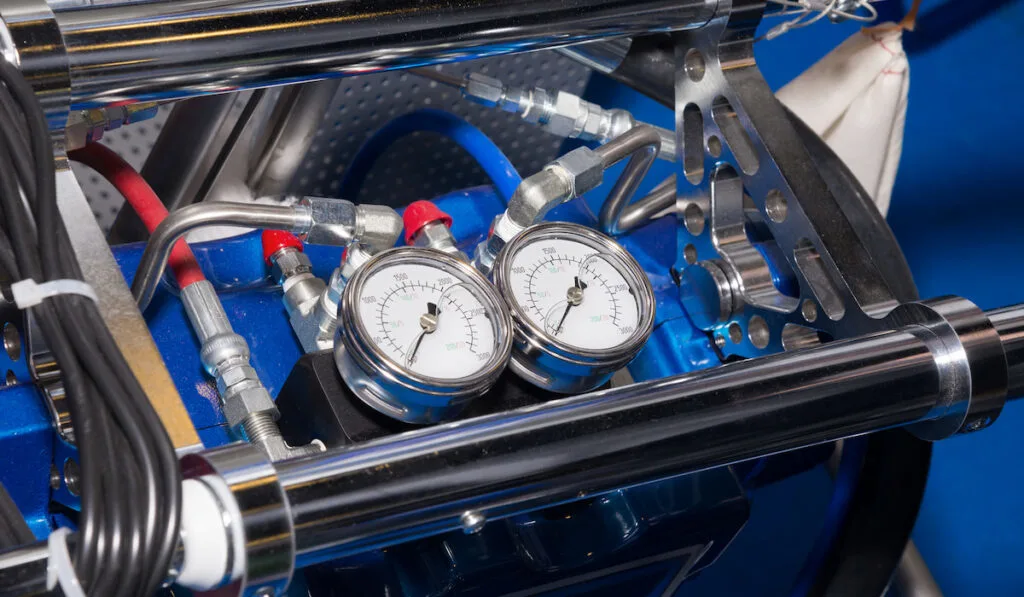*This post may have affiliate links, which means I may receive commissions if you choose to purchase through links I provide (at no extra cost to you). As an Amazon Associate, I earn from qualifying purchases. Please read my disclaimer for additional details.
An air compressor is an indispensable tool to have on hand at home, especially if you love DIY projects. If you have recently bought a compressor, you probably have questions about it. For example, if your compressor gets hot, does that mean there is something wrong with it?
Do air compressors get hot? Air compressors get hot. The friction that occurs when air molecules are squeezed together generates heat. The hot air then moves through the compressor pump head into a compressor receiver. This heat can be felt at the copper line that connects these two items together, as well as in the motor, and compressor head.

It is normal for parts of the air compressor to get hot sometimes, especially if you are running the compressor for an extended period or if it is particularly hot outside.
However, if your air compressor feels unnaturally hot, then it is likely overheating. It’s important to know the difference between normal levels of heat and overheating, and how to prevent your air compressor from overheating.
Table of Contents
The Cause of Normally Occurring Heat inside an Air Compressor
An air compressor works by converting power (whether by a gas engine or electric motor) into energy that is stored as compressed, or pressurized air. This process of conversion causes friction between the air molecules that are being smashed together.
In the same way that rubbing your hands together makes them feel warm and toasty, so too does rubbing millions of tiny air molecules together.
Friction generates heat. This heat can then be felt in various parts of the air compressor as that scorching air travels through the machine.
One part that gets especially hot is the copper tube that connects the compressor pump head to the compressor receiver. This heat is generated by those air molecules being forced together repeatedly while traveling through this tube.
The copper tube’s heat will only increase the longer the air compressor runs. If it takes quite some time for the compressor to reach its cutout point, then more heat will be generated. This will make the touch of that copper piece feel rather uncomfortable.
It is also normal to experience heat coming from the electric motor. When it’s been running consistently, and for an extended period, the motor will get extremely hot. So too will the compressor head.
In fact, you can burn yourself if you touch the compressor head if the machine has been on for a while. It will most certainly have generated enough heat to be too hot to touch.
If the air compressor does shut off when it is supposed to (when it meets its Duty Cycle capacity), then all that heat buildup occurring inside your air compressor is normal.
This heat should not adversely affect your air compressor.
We just don’t recommend you touch the parts of the compressor that are holding heat, so as not to burn yourself. Likewise, do not leave any materials resting on your air compressor when it is running, to avoid any fire hazards when items meet scalding metal.
Possible Reasons for Overheating
It’s important to be familiar with what is and is not normal behavior for your personal air compressor. If your car starts doing something unusual or making a strange noise, it’s likely you can pin-point the problem or at the very least, conclude that something is not right.
If you have purchased a brand-new air compressor, this is a different story, as there’s no way for you to be familiar with the machine yet. However, if your air compressor has been with you for a while and is suddenly hot in a way it has never been before, this is a sign something is not operating correctly.
1. Not Using the Proper Extension Cord / Socket
If you recently plugged your air compressor into an extension cord and noticed excessive heat coming from the machine, it is likely your extension cord is to blame.
If the cord is sharing outlets with other high amperage machines, or if the cord itself simply is not strong enough to ground the machine, then the machine will not work properly.
Essentially, the machine will still run, but won’t be receiving enough power to run properly. Then it will generate unnecessary amounts of heat due to overworking itself with an insufficient amount of energy.
It also matters if the extension cord is too long. If so, you’ll need a shorter, more powerful cord, or to simply move that cord and the machine to a socket closer to the power panel.
Likewise, if you’ve plugged your machine into a new outlet and the machine has grown much too hot, then it could be that the machine amperage is too much for that socket. The socket likely has too small a breaker
2. Overuse
As we mentioned earlier, if your air compressor doesn’t surpass its allotted ‘duty cycle’ and the heat you’re experiencing isn’t excessive, then your air compressor is likely not overheating. However, what happens when it hasn’t reached its duty cycle yet, and it does feel like the motor is unusually hot?
Well, even air compressors that have large duty cycles can still use a rest here and there so that they aren’t continually running and overworking the motor.
Try stopping the compressor every 10-15 minutes, just to give the motor a break. This will also help the compressor’s lifespan as well. If you notice the air compressor is still excessively hot, then the overheating could be caused by something else.
3. Low on Lube
The friction of those aggressive air molecules pressurizing together creates heat, as we now know, and that heat is sent through the pump head and through the tubing.
Again, this heat is generally normal. However, if it feels scalding to touch, and is not usually that hot, there could be an issue inside the pump.
The compressor pump should always be well lubricated. If you haven’t checked this in a while, then the odds are that the oil inside the compressor pump is old.
Old oil loses its mojo over time and cannot properly lubricate. If there is no proper lubrication inside the pump, then unnecessary friction inside the pump can generate that high heat you’re feeling.
Fortunately, this is an easy fix. Lube up that compressor pump!
4. Failing Capacitor
Air compressor motors have capacitors (usually one to start the motor and one to help keep it running.) As you might imagine, capacitors are an important part of a motor.
If a capacitor fails, then the motor will not work properly. That improperly functioning motor will–you guessed it–generate excess heat. When the motor gets too hot, it will likely go into thermal cutout mode to save itself from irreparable heat damage.
If you then attempt to use the compressor again before replacing the capacitor, it will most certainly damage your compressor motor.
A capacitor is much cheaper and easier to replace than an air compressor motor. Therefore, we recommend you pay close attention to your capacitors and replace them when they start to give out.
Don’t know what a capacitor looks like? This video below walks you through the step by step of what they are and why they might not be working properly.
5. Poor Ventilation
Lastly, your air compressor may overheat if the external environment is not cool enough. If the room the air compressor is stored in has poor ventilation or zero air circulation, the air compressor will be affected.
It will essentially make the air inside the compressor, which already gets toasty from the friction of compression, even warmer.
Make sure that the machine has room to breathe and is in a relatively cool space. Don’t place the air compressor directly against a wall or against another object.
Also, never place any objects on top of the compressor while it runs. This could block the air vents and will certainly cause overheating.
The Key Take Away
Air compressors get hot, and this occurrence is normal. However, it is important to mentally note what your properly functioning air compressor is like so that when anything unusual occurs, you can thoroughly investigate and prevent continued overheating. Overheating is caused by numerous factors, like poor ventilation, lack of lubrication inside the pump, and overuse.
To keep a healthy air compressor, run it in intervals, keep it in a cool location, and be sure to use proper cords and outlets to ensure the motor runs effortlessly to avoid excess heat.
